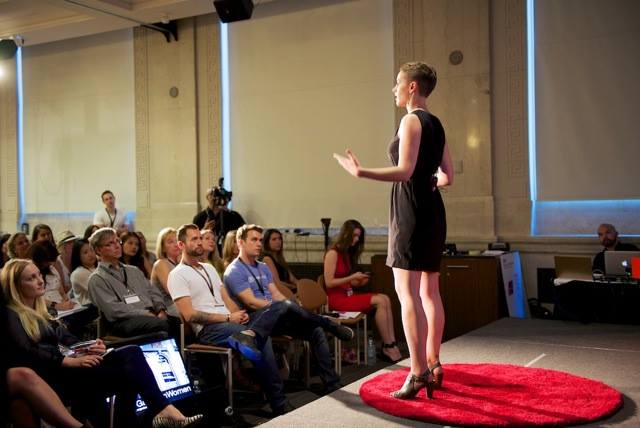By Kristi Alexandra
@kristialexandra
Personal power will be on the pedestal for the sophomore TEDxGastownWomen conference taking place this Saturday, Oct. 29. Held at The Imperial, the day-long symposium — an independently organized spin off of TED Talks — promises to feature 12 influential local ladies exploring and celebrating the power of women and girls to become changemakers and creators.
The curated line-up of CEOs, authors, investors and more includes Israeli-born Canadian lawyer and writer Reut Amit, perhaps best known for her candid feminist essays like “He Never Hit Me” and “That Type Of Girl Deserves It.”
 Loose Lips caught up with Amit to chat personal power, social justice, and storytelling in advance of her talk this weekend.
Loose Lips caught up with Amit to chat personal power, social justice, and storytelling in advance of her talk this weekend.
How has your writing as a feminist complemented your work as a lawyer and doing social justice work?
It doesn’t necessarily – that’s the short answer. I went to UVic law, and UVic has a very strong tradition in social justice advocacy and so my legal education was always interwoven with social justice issues. I think that built the foundation for who I am as a lawyer. There are no “women’s issues.” There are issues. Everything that I see in my life is through the lens of a feminist. I’m not just talking about issues that affect women, because all issues affect women. Feminism is my religion. If you ask how social justice advocacy and feminism are interwoven, well, they were never separate. Because I’m a woman all the time, and I’m a feminist all the time, I just happen to have a skill set that finds expression through that lens.
What came first: your writing or law school?
As a kid, I would always write. I was always more into poetry than prose. I would always be told by my writing teachers that my writing was too “flowery.” And I still get told that by senior lawyers. But I like flowery writing because I find it more convincing – it’s more genuine, it’s from the heart. My writing was long before law school, but I never published it before my law degree. During my schooling, I started cold-calling editors. I sent “That Type of Woman” to the Huffington Post to the Washington Post to the New York Times to Gawker – and nobody answered except for Gawker. One editor really loved it and he essentially fought for me; he sent it to his editor and he published it, and that was that. It was a domino effect from there. Other editors read it and loved it and started contacting me and asking me to write for them.

You’ll be talking about “He Never Hit Me” for the TEDxWomen’s talk. Will you be bringing your law background into it?
“He Never Hit Me” was very personal. I’m sort of like an external observer sometimes in my other pieces, I see myself as an advocate. “He Never Hit Me” was a first-person account, which was interesting because it got so much play. People connected to it so deeply, that as a writer, it was interesting to see, when I write from a place that is so vulnerable, how powerful that can be.
The TEDx event is all about power. How will your ex-relationship be a tool to talk about power?
The TEDx talk is not about my relationship – it’s about the article. What the talk is going to be about it is the aftermath of publishing the article. What happened after I published the article was extraordinary. I published the article in 2014, and immediately it went viral. Huff Post translated it into several different languages, so then it expanded even more widely, which was great because I wanted it to reach as many people as possible. But what happened was all these women from all over the world started writing me messages and started contacting me. I’m talking innumerable women. Each woman was telling me they thought they were alone in this story, that they couldn’t believe that I had essentially looked into their bedrooms and had written precisely what was happening to them. They were amazed that someone else had experienced the exact same thing. We really don’t recognize emotional abuse in our society and [the response] was extraordinary.
You travel a lot and do a lot of writing on social justice issues: what have you seen in your travels that you now advocate for?
I travel around a lot in the developing world and parts of the world that are poverty stricken, and it’s a bit of a cliché to say this at this point but poverty is sexist and women are its number one victim. It also perpetuates sexism itself. The thing I often notice is the absence of women in power in a lot of these places. For me, the tool I use best is writing and speaking and it’s only as powerful as the readership and the people it reaches. I’m figuring that out and I’m working on it.
Hear Reut Amit speak on Saturday, Oct. 29 at TEDxGastownWomen at the Imperial (319 Main Street) in Gastown.
 Kristi Alexandra is an unabashed wino and wannabe musician. Her talents include drinking an entire bottle of cabernet sauvignon, singing in the bathtub, and falling asleep.
Kristi Alexandra is an unabashed wino and wannabe musician. Her talents include drinking an entire bottle of cabernet sauvignon, singing in the bathtub, and falling asleep.



